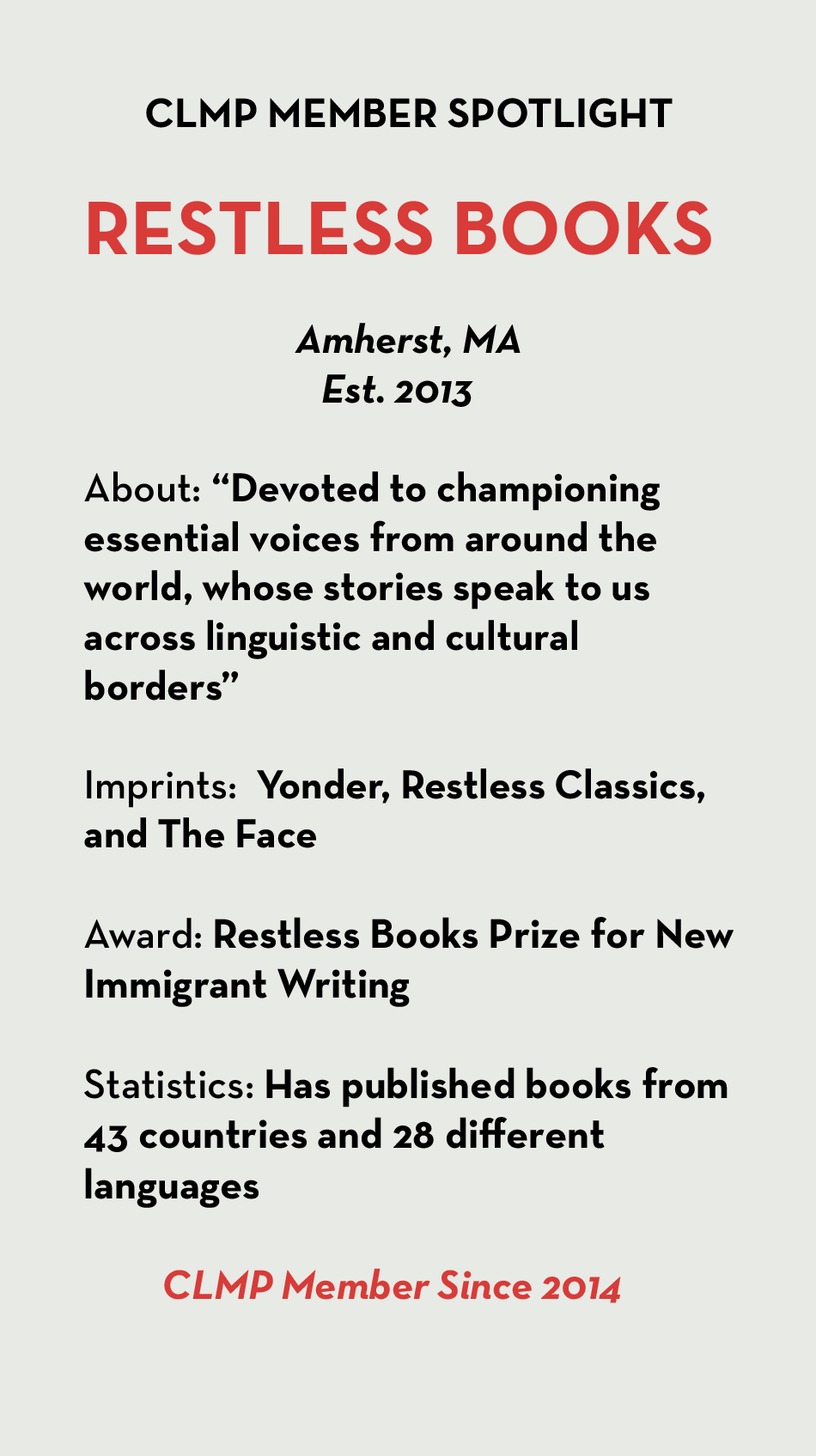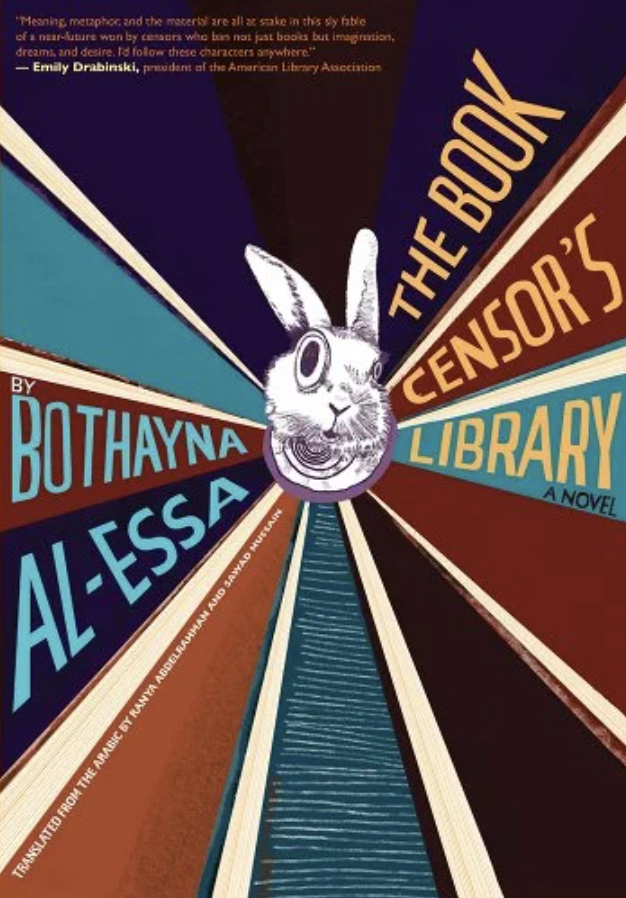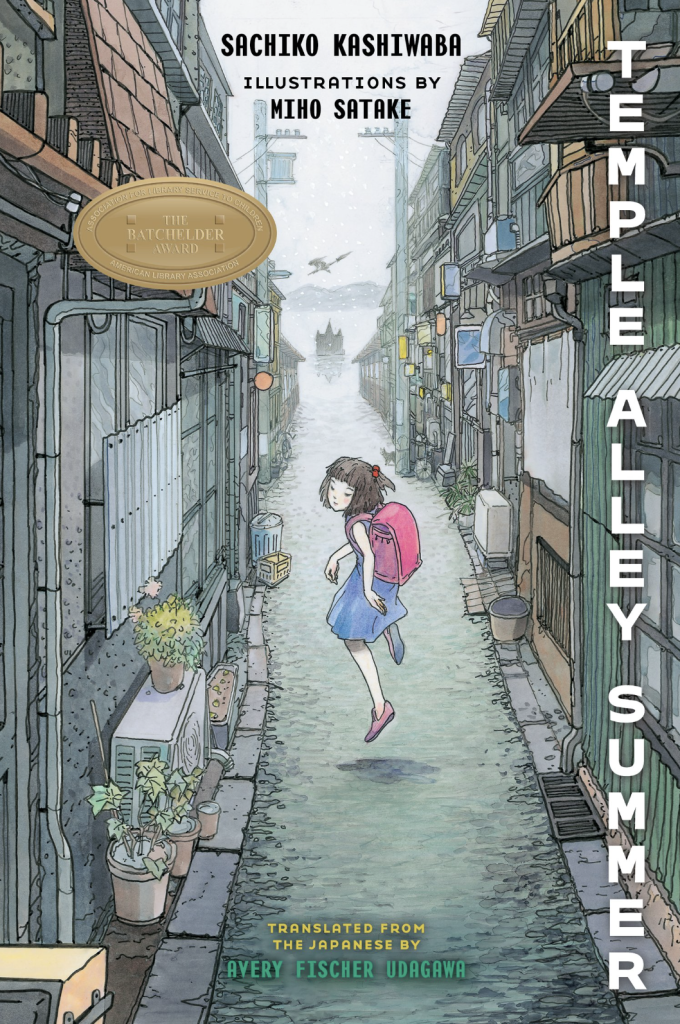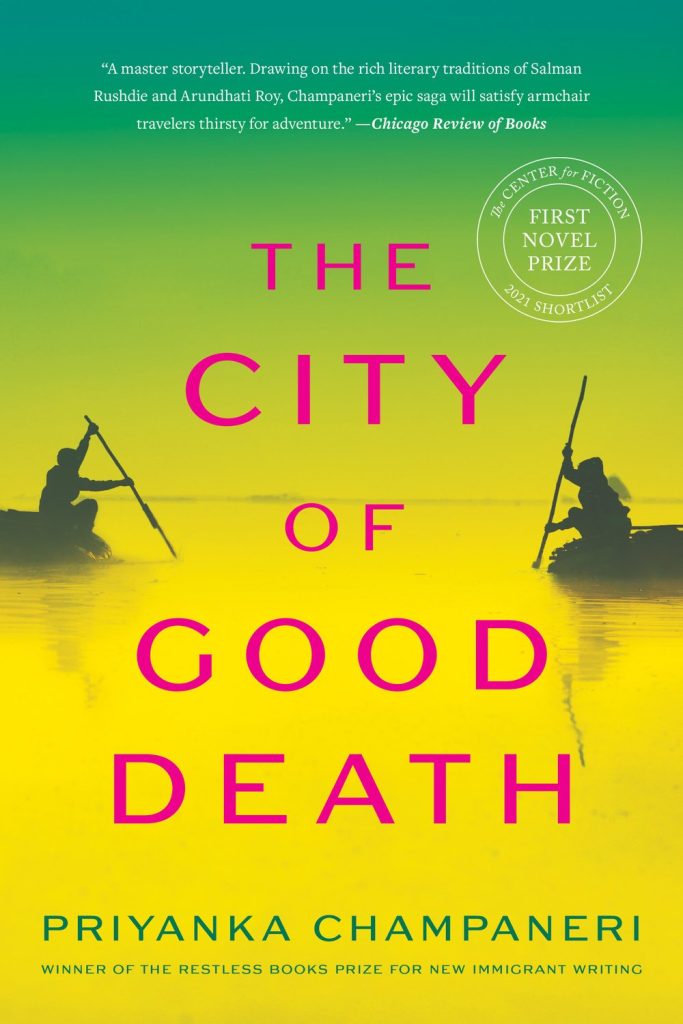We spoke with Lydia McOscar, managing editor of Restless Books, in our latest Member Spotlight.
 What is the history behind Restless Books? When was it founded and what is its mission?
What is the history behind Restless Books? When was it founded and what is its mission?
Restless Books was founded in 2013 and just celebrated its tenth anniversary. The idea for the press germinated when our founders, Ilan Stavans, Annette Hochstein, and Joshua Ellison, looked at the amount of international literature available in the United States and found the offerings sorely lacking. There was such an abundance of spectacular work that Anglophone readers didn’t yet have access to, and our founders also sensed a yearning for writing that didn’t fit the cookie-cutter mold of commercial publishing. So they set out to bring the best untold stories to our own shores and broaden the country’s literary appetite in the process.
We began as an ebook-only press and made some big changes along the way. Besides moving to print, we became a nonprofit, and our initial focus on Jewish and Latin American literature has expanded by leaps and bounds. We’ve published books from 43 countries and 28 different languages, and we’re eager to lengthen that list.
What are some of the rewards and challenges of publishing literature from around the world, often in translation?
 Publishing translated work is an expensive venture; you’re paying advances and royalties to at least two creators on top of all the regular costs of publishing a book (printing, distribution, promotion, etc.). And I won’t lie, the paperwork is a bear. Most people don’t go into publishing with a dream of puzzling out legal territory contracts (though this is meditative in its own way).
Publishing translated work is an expensive venture; you’re paying advances and royalties to at least two creators on top of all the regular costs of publishing a book (printing, distribution, promotion, etc.). And I won’t lie, the paperwork is a bear. Most people don’t go into publishing with a dream of puzzling out legal territory contracts (though this is meditative in its own way).
For me, one of the great rewards is the overdue recognition of translation as an art form. Translators’ work has long been devalued, sometimes going completely uncredited in a printed book. With the rise of AI, we’re learning that many people still consider the transition between languages to be a mechanical one. At Restless, we’re as devoted to the work of our translators as to that of our authors. Translators often work double-duty to champion not only the work itself, but the writer whose work they’re translating in a space where they’re not yet recognized. A good translator moves between two languages and two cultures, shepherding a story through its transformation. It’s a relationship that requires a lot of trust between author, translator, and editor.
It’s also gratifying when we can bring an author global attention. Before joining Restless, I didn’t realize how much status comes with a book being translated into English—it makes the foreign agents sit up! We recently released The Book Censor’s Library by Bothayna Al-Essa (translated from the Arabic by Ranya Abdelrahman and Sawad Hussain), and within weeks we had interest from publishers in Russia, Indonesia, Italy, and Serbia.
You also publish the imprints Yonder, Restless Classics, and The Face. Can you tell us more about each?
 Rare is the adult bookworm who didn’t come to reading at an early age. We believe curiosity is the engine of restlessness, so we want to instill young readers with a wonder for the wider world. Thus Yonder, our children’s imprint, was born (with a lot of help from a Kickstarter campaign). Yonder publishes picture books as well as middle grade and young adult literature of all stripes, with an emphasis on diverse viewpoints. We’re one of the few regular publishers of translated children’s literature in the US, and some of Restless’s most-recognized books are Yonder titles, like the bestselling Batchelder Award–winner Temple Alley Summer by Sachiko Kashiwaba (translated from the Japanese by Avery Fischer Udagawa), or our latest Yonder book, The Wildcat Behind Glass by Alki Zei (translated from the Greek by Karen Emmerich), which drew the attention of Adam Gopnik in the New York Times.
Rare is the adult bookworm who didn’t come to reading at an early age. We believe curiosity is the engine of restlessness, so we want to instill young readers with a wonder for the wider world. Thus Yonder, our children’s imprint, was born (with a lot of help from a Kickstarter campaign). Yonder publishes picture books as well as middle grade and young adult literature of all stripes, with an emphasis on diverse viewpoints. We’re one of the few regular publishers of translated children’s literature in the US, and some of Restless’s most-recognized books are Yonder titles, like the bestselling Batchelder Award–winner Temple Alley Summer by Sachiko Kashiwaba (translated from the Japanese by Avery Fischer Udagawa), or our latest Yonder book, The Wildcat Behind Glass by Alki Zei (translated from the Greek by Karen Emmerich), which drew the attention of Adam Gopnik in the New York Times.
While most of Restless’s books are contemporary, our Classics imprint reimagines the English literary canon for a modern global audience. We commission fresh illustrations as well as introductions by authors whose work crosses paths with these literary touchstones (most recently Silvia Moreno-Garcia and Alexander Chee for Dracula by Bram Stoker), and we accompany the books with free discussion guides that readers can access online.
Last of all, The Face series was inspired by a quote from Jorge Luis Borges: “As the years go by, he peoples a space with images of provinces, kingdoms, mountains, bays, ships, islands, fishes, rooms, instruments, stars, horses, and individuals. A short time before he dies, he discovers that the patient labyrinth of lines traces the lineaments of his own face.” Each book is a different writer’s foray across the landscape of their own face and identity, whether through memory or spirituality, laugh lines or skin color, anguish or humor.
What are some other presses, literary journals, and organizations you admire that are “championing essential voices from around the world”?
Archipelago Books has been printing works of art for two decades, and I often draw inspiration from them. I can’t say enough good things about Transit Books, Deep Vellum Publishing, and Two Lines Press; I’m always eager to see their catalogs, and it doesn’t hurt that the books are gorgeous. Two Lines is also the publishing arm of the Center for the Art of Translation, which runs an excellent journal, events, and other programming. Feminist Press and And Other Stories always have excellent translations on tap, and I turn to them when I look for something bold.
By the way, all of these publishers have subscriptions available for their upcoming titles. When a new book arrives on my doorstep that I know nothing about (besides the fact that it was hand-picked by folks with the best taste in the business), it holds an allure that the patient pile on my nightstand can’t compete with.
Can you tell us about the Restless Books Prize for New Immigrant Writing —its history, its mission, its significance?
 The Prize for New Immigrant Writing is my favorite part of our work at Restless. It began in 2015 and is open to debut writers who are immigrants, or whose parents are immigrants. We alternate year-to-year between fiction and nonfiction, and the winner doesn’t just receive cash, but a $10,000 advance for their first book, which Restless acquires, promotes, and publishes. The mission is to lay groundwork for the long literary careers of authors who otherwise have fewer opportunities to get their work into print. This industry is so hard to break into, and if we can open a door for these writers of tremendous talent, they have an opportunity to stride ahead. Many of our past prize-winners are long-term supporters of Restless and come back to the award as guest judges. Restless considers immigrant stories and voices to be particularly essential, especially in a time of increased displacement worldwide and rising political xenophobia, so the award is at the heart of all we do.
The Prize for New Immigrant Writing is my favorite part of our work at Restless. It began in 2015 and is open to debut writers who are immigrants, or whose parents are immigrants. We alternate year-to-year between fiction and nonfiction, and the winner doesn’t just receive cash, but a $10,000 advance for their first book, which Restless acquires, promotes, and publishes. The mission is to lay groundwork for the long literary careers of authors who otherwise have fewer opportunities to get their work into print. This industry is so hard to break into, and if we can open a door for these writers of tremendous talent, they have an opportunity to stride ahead. Many of our past prize-winners are long-term supporters of Restless and come back to the award as guest judges. Restless considers immigrant stories and voices to be particularly essential, especially in a time of increased displacement worldwide and rising political xenophobia, so the award is at the heart of all we do.
How can interested writers submit their work to Restless Books?
Submissions to the annual Prize for New Immigrant Writing closed on May 31, and we’ll be busy reading these manuscripts for the rest of the summer—but from September to May, we consider submissions from agents and translators. (These can be sent to [email protected].) We’re particularly interested in work from indigenous writers, LGBTQ+ writers, and authors who identify as people with disabilities. We’re also looking for work from languages and countries that we have not yet represented, especially in the Middle East and Africa.
